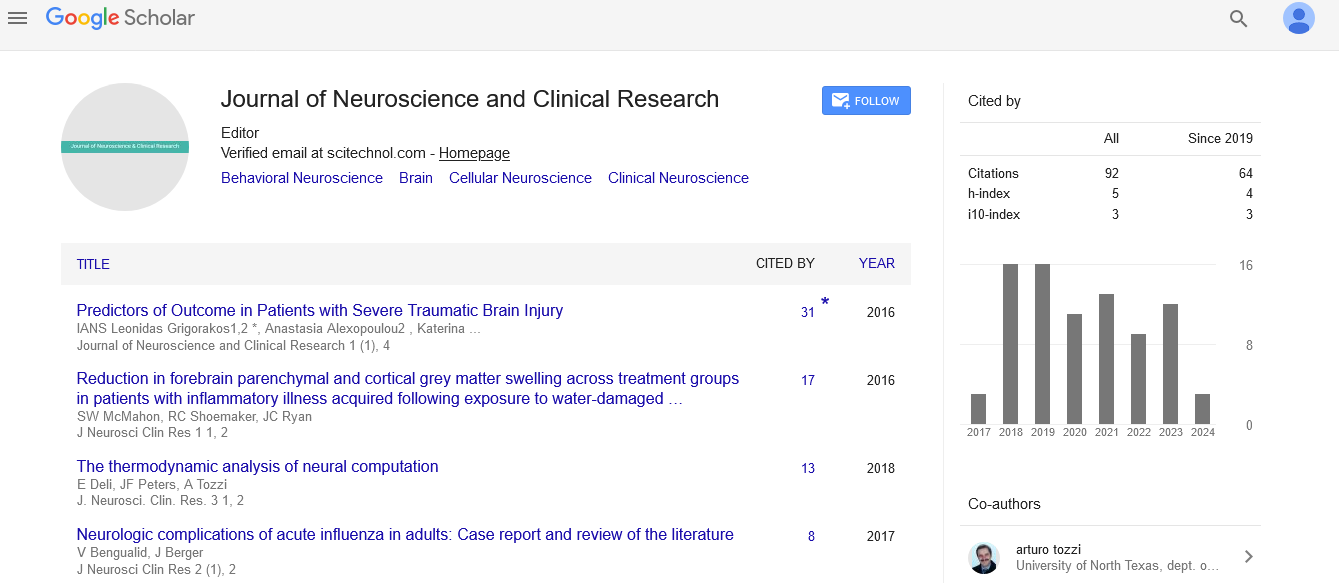Opinion Article, J Neurosci Clin Res Vol: 8 Issue: 1
The Role of Neuro inflammation in Neurodegenerative Diseases
Jun Zhang Li*
Department of Pharmacy, The First Affiliated Hospital of Zhengzhou University, Zhengzhou, China
*Corresponding Author: Jun Zhang Li
Department of Pharmacy, The First
Affiliated Hospital of Zhengzhou University, Zhengzhou, China
E-mail: jun_li22@zhang.edu.cn
Received date: 28 February, 2023, Manuscript No. JNSCR-23-95530;
Editor assigned date: 03 March, 2023, Pre QC No. JNSCR-23-95530(PQ);
Reviewed date: 17 March, 2023, QC No. JNSCR-23-95530;
Revised date: 24 March, 2023, Manuscript No. JNSCR-23-95530(R);
Published date: 31 March, 2023, DOI: 10.4172/Jnscr.1000141
Citation: Li JZ (2023) The Function of Neuro-inflammatory Diseases in Neurodegenerative Disorders. J Neurosci Clin Res 8:1.
Description
Neuro inflammation is the process by which the body's immune system responds to injury, infection or damage to the nervous system. This response involves the activation of immune cells and the release of pro-inflammatory molecules, such as cytokines and chemokines, which can cause damage to the neurons and the surrounding tissue. While neuro inflammation is a normal part of the body's response to injury, chronic or excessive inflammation can lead to neurodegenerative diseases.
Neurodegenerative diseases are a group of disorders characterized by the progressive loss of neurons and the deterioration of the nervous system. These diseases include Alzheimer's disease, Parkinson's disease, Huntington's disease, and Amyotrophic Lateral Sclerosis (ALS). The role of neuro inflammation in the development and progression of neurodegenerative diseases is a topic of ongoing research and debate.
One of the main ways in which neuro inflammation contributes to neurodegenerative diseases is by causing damage to the neurons and the surrounding tissue. This damage can result in the release of toxic molecules, such as reactive oxygen species, which can further damage the neurons and lead to their death. In addition, chronic inflammation can lead to the accumulation of abnormal proteins, such as betaamyloid in Alzheimer's disease and alpha-synuclein in Parkinson's disease, which can interfere with normal neuronal function and contribute to disease progression.
Another way in which neuro inflammation contributes to neurodegenerative diseases is by disrupting the Blood-Brain Barrier (BBB). The BBB is a specialized structure that separates the brain from the rest of the body and regulates the passage of molecules and cells between the blood and the brain. Chronic inflammation can lead to the breakdown of the BBB, allowing immune cells and molecules to enter the brain and cause further damage to the neurons and the surrounding tissue.
The immune response in the brain is tightly regulated by a group of cells called microglia. Microglia are the resident immune cells of the brain and play an important role in maintaining normal brain function. In response to injury or infection, microglia become activated and release pro-inflammatory molecules to fight off the invading pathogens. However, chronic or excessive activation of microglia can lead to neuro inflammation and contribute to neurodegenerative diseases.
Recent studies have also shown that neuro inflammation can contribute to the formation of tau protein tangles in Alzheimer's disease. Tau protein tangles are a hallmark of Alzheimer's disease and are thought to contribute to the death of neurons in the brain. Neuro inflammation can activate a protein called GSK3-beta, which can lead to the phosphorylation and aggregation of tau protein, resulting in the formation of tau tangles.
Although the exact mechanisms underlying neuro inflammation in neurodegenerative diseases are still being investigated, several potential therapeutic strategies have been proposed. One approach is to target the immune system directly, either by inhibiting microglial activation or by promoting anti-inflammatory responses. For example, drugs that block the activation of microglia, such as minocycline and ibudilast, have been shown to reduce neuro inflammation.
In summary, neuro inflammation plays a significant role in the development and progression of neurodegenerative diseases. Chronic or excessive inflammation can lead to the damage of neurons and the surrounding tissue, disrupt the BBB, and contribute to the accumulation of abnormal proteins. Understanding the mechanisms underlying neuro inflammation in neurodegenerative diseases is essential for the development of new treatments and therapies aimed at preventing or slowing disease progression.
 Spanish
Spanish  Chinese
Chinese  Russian
Russian  German
German  French
French  Japanese
Japanese  Portuguese
Portuguese  Hindi
Hindi 